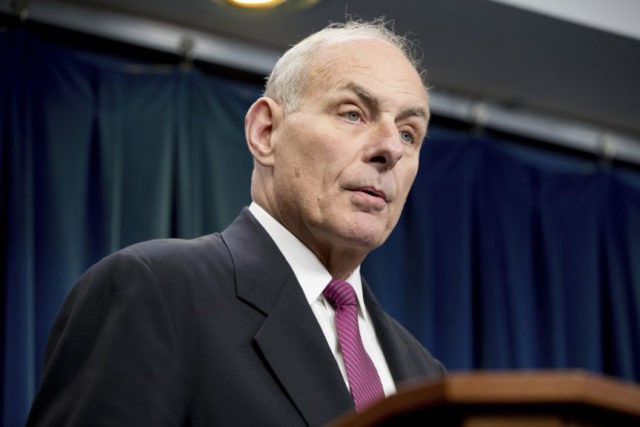The top Democrat on the Senate’s homeland defense committee insisted Wednesday that U.S. border officials should not ask incoming visitors — including jihadis — about their ideological worldview or even ask to check stored images on their cellphones.
“My hair is on fire about this, I am really upset about this,” said Missouri Sen. Claire McCaskill, the top Democrat on the Senate Committee on Homeland Security and Governmental Affairs. “We are signaling something that is very non-American to the rest of the world by announcing this [border] policy,” she told Gen. John Kelly, the secretary of the Department of Homeland Security.
McCaskill — who is up for re-election in November —also complained that the policy would be ineffective at stopping terrorists. “If they know we’re going to look at their phones, and we know we’re going to ask [ideological questions] … they’re going to lie. Are we going to use polygraphs?”
“We could do that for all the people we put into secondary [review],” Kelly responded. “Generally speaking, the average tourist coming into the United States is not” going to be asked for their phones or be asked questions about their beliefs, Kelly said.
McCaskill also suggested that the preferences of foreigners should be considered equal to the preferences of Americans, saying “Americans would never put up with this in other countries … we don’t want to send that signal.”
Kelly rejected McCaskill’s complaints, “this is nothing new – we’ve being [asking ideological questions] for a couple of years,” and suggested that officials might use lie-detecting polygraph tests on some visitors who might lie about their links with jihad groups.
For many years, immigration documents, including the N-400 citizenship application form, have required would-be immigrants to describe their ties with various ideological groups and to explain their personal beliefs.
GOP members of the committee slammed McCaskill.
Committee chairman Wisconsin Sen. Ron Johnson noted that the border officials checked the phones of 26,000 visiting individuals in 2016, up from less than 1,000 in 2015. “This is not new – this is being blown somewhat out of proportion,” Johnson said. Only 0.06 percent of visitors arriving from overseas flights have their phones checked, he said.
Sen. John McCain also pushed back against McCaskill. The stream of news reports showing the Islamic State sending people to launch terrorist attacks in the United States “sets my hair on fire,” he said, adding “maybe we ought to put a little perspective on this hysteria.”
GOP Sen. Rand Paul said officials should not be allowed to demand to view the cellphones of returning citizens. ‘That’s obscene,” he told Kelly, adding that officials probably have the right to exclude people who refuse to have their phones inspected.
Kelly downplayed the particular ideological questions cited by McCaskill, even as he pushed back against her complaints. “We will go to those questions or request social media [access on cellphones] … We’ll be going in that direction when the [DHS] professionals at the [border] counter decide to go in that direction,” he said.
Searching visitors’ cell phones is just like searching visitors’ luggage, Kelly said, adding that most searches of cell phones consist of quick searches through stored photographs and videos. In one recent case, border officials asked a visitor from the Middle East for his phone, which showed contacts with several terrorist organizers, plus images of murdered gays, Kelly said. Border officials asked for his phone because “there was something not quite right about him,” he said, adding that “we sent him back.”
In other searches of cellphones, “we find child pornography, we find really grisly photos of terrorist acts,” he said.
In her second round of questions after the criticism from GOP senators, McCaskill partially retreated. “For some [visitors], maybe we should do polygraphs,” she said, and then changed the subject to other questions, such as rules for checking domestic air travelers’ identification.

COMMENTS
Please let us know if you're having issues with commenting.